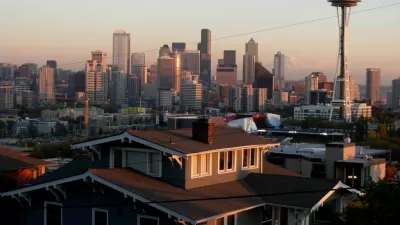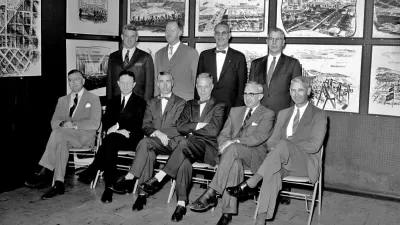The debate about police reform in Minneapolis is only one arena for the city's reckoning with systemic racism.

The protests sweeping the nation started in Minneapolis, a city that has frequently taken the lead on matters of social and economic justice among U.S. cities. But that track record hasn't done enough to overcome the discriminatory underpinnings of the racist housing covenants that stacked the economic deck against Black residents and people of color in the city.
According to an article by Jared Brey, volunteers working for the Mapping Prejudice project, first reported by Next City in 2017, have uncovered evidence of the "deep racial inequalities that contradict the city’s self-image as a bastion of progressive politics."
The city has increased funding for its Affordable Housing Trust Fund since 2018 and approved an innovative comprehensive plan to implement a supply-side approach to housing affordability by legalizing new Missing Middle density in residential neighborhoods across the city. "But housing advocates are still trying to push through tenant protections like just-cause eviction rules and rent control, while acknowledging that housing inequality can’t be undone by housing policy alone," according to Brey.
Led by The Alliance, a coalition of community groups focused on regional equity, advocates in Minneapolis are pushing for the Equity in Place policy agenda, "which would give tenants the right of first refusal when their building owner plans to sell, similar to laws in Washington, D.C., and San Francisco," according to Brey. "The agenda also includes community control of land and housing through community land trusts, reforming tenant-screening processes, and increasing funding for community organizing work."
FULL STORY: Facebook Twitter Email Minneapolis Housing Advocates Look Ahead

Alabama: Trump Terminates Settlements for Black Communities Harmed By Raw Sewage
Trump deemed the landmark civil rights agreement “illegal DEI and environmental justice policy.”

Planetizen Federal Action Tracker
A weekly monitor of how Trump’s orders and actions are impacting planners and planning in America.

The 120 Year Old Tiny Home Villages That Sheltered San Francisco’s Earthquake Refugees
More than a century ago, San Francisco mobilized to house thousands of residents displaced by the 1906 earthquake. Could their strategy offer a model for the present?

Ken Jennings Launches Transit Web Series
The Jeopardy champ wants you to ride public transit.

BLM To Rescind Public Lands Rule
The change will downgrade conservation, once again putting federal land at risk for mining and other extractive uses.

Indy Neighborhood Group Builds Temporary Multi-Use Path
Community members, aided in part by funding from the city, repurposed a vehicle lane to create a protected bike and pedestrian path for the summer season.
Urban Design for Planners 1: Software Tools
This six-course series explores essential urban design concepts using open source software and equips planners with the tools they need to participate fully in the urban design process.
Planning for Universal Design
Learn the tools for implementing Universal Design in planning regulations.
Clanton & Associates, Inc.
Jessamine County Fiscal Court
Institute for Housing and Urban Development Studies (IHS)
City of Grandview
Harvard GSD Executive Education
Toledo-Lucas County Plan Commissions
Salt Lake City
NYU Wagner Graduate School of Public Service





























